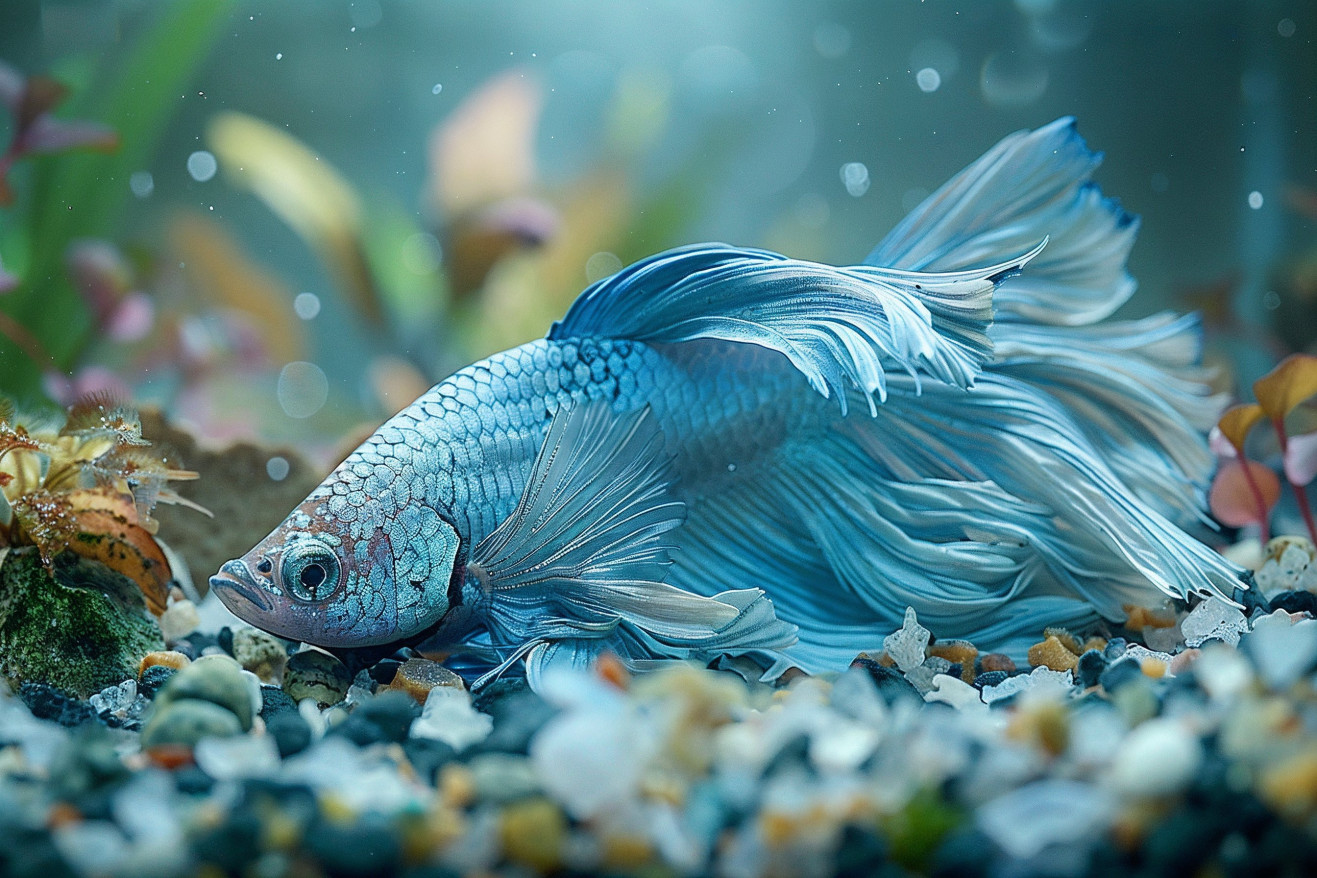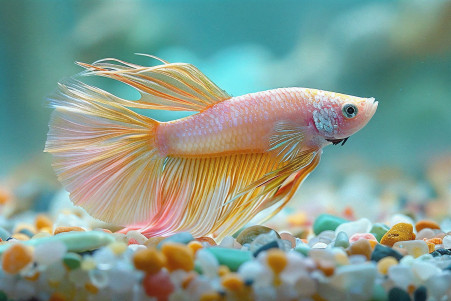Why Is My Betta Fish Not Moving? Causes and Solutions
30 April 2024 • Updated 30 April 2024

If you’ve found that your betta fish isn’t moving as much as it used to or is even lying at the bottom of the tank, there are a number of potential causes, including water quality issues, disease, and environmental factors. Whether it’s ammonia poisoning, low oxygen levels, or bacterial or parasitic infections, betta fish not moving is a sign of poor water quality and a health problem that needs to be addressed with the right care and treatment.
This problem is often the result of a lack of proper tank care and environmental factors that can quickly lead to the deterioration of the health of these beautiful, active fish. To get your betta fish back to its normal self, we’ll go through a number of studies and expert opinions that discuss the potential causes of a betta fish’s lethargy and what you can do to help it get back to its normal, active self.
Why is my betta fish not moving?
Water Quality Issues: A Common Cause of Betta Lethargy
One of the most common reasons for betta fish not moving is poor water quality, according to Dr. Caryn, a veterinary expert. High levels of ammonia, nitrites, and nitrates can be toxic to bettas and cause them to be less active or responsive. Even the smallest amounts of ammonia or nitrites above 0 ppm can be toxic to bettas, leading to a loss of appetite, lethargy, and other symptoms, according to Fish Vet.
Another water quality issue that can lead to betta fish not moving is low oxygen levels. This is often caused by a lack of surface agitation or overcrowding, which can prevent proper gas exchange. Dr. Caryn suggests making sure the filter is working to help aerate the water.
Water temperature that's too low can also slow down a betta's metabolism, leading to decreased activity. While bettas are tropical fish that prefer water temperatures between 78-82°F, cooler water can cause them to be less active. On the other hand, warmer water can cause their metabolism to speed up to levels that are unsustainable.
To avoid these problems, it's important to regularly test the water and perform partial water changes. Fish Vet suggests using a reliable test kit and changing 25-30% of the water when ammonia or nitrites are detected at levels above 0 ppm. This will help ensure that the tank maintains a healthy, low-stress environment that supports betta fish health and well-being. That said, if water quality issues continue, it could be a sign of an underlying health problem.
How to Diagnose and Treat Betta Fish Diseases
There are a number of bacterial, parasitic, and fungal infections that can cause a betta to become lethargic and inactive. According to Bettafish.org, common betta diseases like fin rot, columnaris, dropsy, and swim bladder disease often cause symptoms like lethargy, loss of appetite, and discoloration.
This is why it's so important to get an accurate diagnosis, as different diseases will require different treatments, including antibiotics, antifungal medications, and salt baths. Once you have a diagnosis, you will need to make sure that you start the treatment options immediately and follow the medication instructions to a T. In some cases, you may need to quarantine your sick betta in a hospital tank to ensure that the treatment is effective and to prevent the spread of the disease.
The sooner you can catch the disease and start treatment, the better the chances of your betta recovering and returning to its normal, active self. PetHelpful explains that if you make sure to do things like daily water changes and use the right medications, you can often get a sick betta back on the road to recovery in as little as a week. It's also important to make sure that you're treating any underlying health issues that may be causing your betta to be less active.
Environmental Factors: How to Make Your Betta Fish Feel at Home
Betta fish are known to be particularly sensitive to their surroundings, and environmental stressors can lead to a lack of energy and activity. According to USBetta, some of the things that can cause stress and a lack of activity in bettas include aggressive tank mates, strong water flow, and a lack of hiding spaces.
That’s why it’s important to make sure that your tank is set up properly, with the right tank size, decorations, and tank mates. According to Petco, while you don’t want to overcrowd your tank, you also don’t want to leave it completely empty. The right substrate, plants, and hiding spaces can help maintain water quality and make bettas feel safe.
In addition, environmental stress can be reduced by making sure that your betta fish have a consistent day-night cycle, enough surface area for oxygen exchange, and a stable water temperature. Hepper recommends turning off the lights in your tank at night to make sure that your betta fish get 8-12 hours of sleep. It’s also important to make sure that your tank is properly oxygenated, which can be done with an air stone or surface agitation.
By making sure that you’re addressing environmental stressors and that your betta fish are living in a safe, comfortable environment, you can help them overcome their lack of energy and become more active. With the right care, your betta fish can be happy and healthy and back to their old selves in no time.
How to Revive a Lethargic Betta Fish: A Step-by-Step Guide
If you notice that your betta fish is lethargic, there are a few things you can do to try and revive it. According to wikiHow, the first thing you should do is test the water quality and change the water if necessary. Make sure to use a dechlorinator and adjust the temperature to between 78-82°F.
The Betta Fish Forum recommends adding aquarium salt or botanical antimicrobials like Bettafix or Melafix to help with potential infections or parasites. PetHelpful stresses the importance of making sure your betta fish is in a stress-free environment by ensuring the tank is set up correctly, providing hiding places, and making sure the other fish in the tank are compatible.
If your betta fish is still lethargic after you've tried these steps, wikiHow says you should consult a vet to get a proper diagnosis and treatment plan. With the right care, you can nurse your lethargic betta fish back to health and happiness. That said, it's also important to know what a healthy and happy betta fish looks like so you can avoid future problems.
How to Tell If Your Betta Fish Is Happy and Healthy
A happy and healthy betta fish will be active and lively, swimming around its tank and exploring its surroundings. According to BeChewy, signs of a healthy betta fish include a good appetite, bright colors, and shiny scales, and it won’t show any signs of illness or injury.
Bubble nesting, gill flaring, and finger following are all signs of a happy and healthy betta fish, according to Tropicflow. Meanwhile, a clean tank with the right water conditions, temperature, and hiding places will help ensure your betta fish is happy and healthy, according to Tropicflow.
By paying attention to your betta fish’s behavior and physical condition, you can tell when it’s doing well or when something might be wrong. Knowing what to look for in a happy and healthy betta fish will help you make sure your pet stays active, healthy, and happy.
Conclusion: How to Best Support Your Betta Fish
As noted by Dr. Universe from Washington State University, there are many reasons why betta fish may be lethargic or inactive. However, the most common cause is environmental stress, which can be caused by a lack of proper care. This includes maintaining the right water temperature, ensuring that the water flow in the tank isn’t too strong, and making sure that the water has enough surface area for the fish to breathe.
If a betta is inactive after a water change, as reported by the Betta Fish Forum, it’s likely that the fish is in shock from the change. This is why it’s important to make sure that any changes to the tank are made gradually.
In addition, a betta’s diet and health can also lead to inactivity, as noted by The Spruce Pets. This is why it’s important to make sure that the fish is eating a balanced diet and to keep an eye out for any signs of disease.
By making sure that your betta’s environment, diet, and care are all up to par, you can help your betta fish return to its normal, active state. It’s also important to make sure that you’re paying close attention to your betta’s behavior and taking action if you notice any changes to ensure that your fish remains healthy and happy in the long run.


